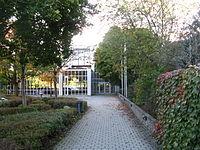- Max Planck Institute of Quantum Optics
-
Max Planck Institute of Quantum Optics 
Abbreviation MPQ Formation 1981 Location Garching bei München, Germany Website http://www.mpq.mpg.de/cms/mpqhome/index.html The Max Planck Institute of Quantum Optics (abbreviation: MPQ; German: Max-Planck-Institut für Quantenoptik) is a part of the Max Planck Society which operates 80 research facilities in Germany.
The institute is located in Garching, Germany, which in turn is located 10 km north-east of Munich. Five research groups work in the fields of laser physics, quantum information theory, laser spectroscopy, quantum dynamics and quantum many body systems.
Contents
History
The Max Planck Institute of Quantum Optics was founded on January 1, 1981. It was a successor of a project group for laser research of the Max Planck Institute for Plasma Physics which was established in 1976. The use of lasers for fusion research, quantum optics and spectroscopy were the goals of the project group, which consisted of 46 members.
The institute was accommodated for a time on the premises of the Max Planck Institute for Plasma Physics. The institute moved to the new building in July, 1986 and officially separated from the Max Planck Institute for Plasma Physics. With the appointment of Theodor Hänsch as head of the new institute from Stanford University, the institute grew significantly. Hänsch was also given a chair at the Ludwig Maximilian University of Munich which ensured close links between MPQ and the university complex in Munich. After the retirement of Siegbert Witkowski in 1993, the research on the high energy laser was stopped and other research areas were started. The new Department of Quantum Dynamics of Gerhard Rempe started working in 1999.[1]
Research
The institute conducts investigations in quantum physics. The faculty members conducts research in topics such as theoretical quantum optics, quantum information theory, Bose-Einstein condensation, ultra-high-resolution laser spectroscopy, quantum physics of ultra-cold atoms, femtochemistry, coherent control, development of components for quantum computers and quantum networks, Bose-Einstein condensation of degenerate quantum gases, etc. It also conducts research in other areas where lasers play a central role. There was a group at MPQ that conducted experiments on gravitational waves.[2]
In 2005, Theodor W. Hänsch of this institute was awarded the Nobel Prize in Physics, together with John L. Hall, "for their contributions to the development of laser-based precision spectroscopy, including the optical frequency comb technique".[3]
Degree programme
- MPQ offers Ph.D. programme "International Max-Planck Research School (IMPRS) on Advanced Photon Science" together with the Ludwig Maximilian University of Munich, Technical University of Munich and the Vienna University of Technology.
References
- ^ "History of Max Planck Institute of Quantum Optics". The Max Planck Society. http://www.mpg.de/english/institutesProjectsFacilities/instituteChoice/quantenoptik/instProfil/instGeschichte/index.html. Retrieved 2007-12-21.
- ^ "Max Planck Institute of Quantum Optics (Research)". The Max Planck Society. http://www.mpg.de/english/institutesProjectsFacilities/instituteChoice/quantenoptik/instProfil/instForschungsthemen/index.html. Retrieved 2007-12-21.
- ^ "The Nobel Prize in Physics 2005". The Nobel Foundation. http://nobelprize.org/nobel_prizes/physics/laureates/2005/index.html. Retrieved 2007-12-21.
External links
- Homepage of the Max Planck Institute of Quantum Optics
- Hompeage of The International Max Planck Research School on Advanced Photon Science (IMPRS-APS)
Coordinates: 48°15′34″N 11°40′0″E / 48.25944°N 11.666667°E
Categories:- Max Planck Society
- Research institutes in Germany
- Physics institutes
- Research institutes established in 1981
- Garching
Wikimedia Foundation. 2010.
